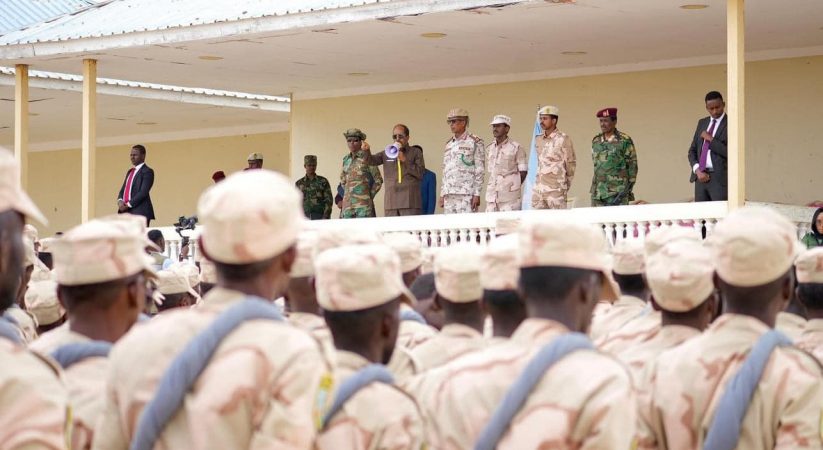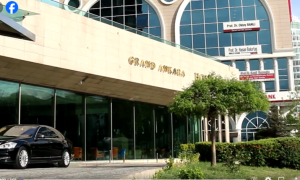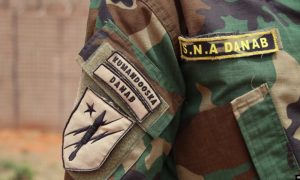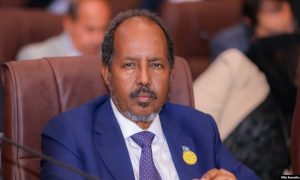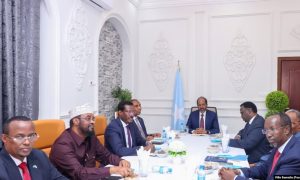
The plight of soldiers who were meant to replace ATMIS forces, now facing uncertainty and danger
MOGADISHU | April 10, 2023 – The return of the 3,600 Eritrea-trained soldiers has exposed a significant gap in Somalia’s national defense strategy. These soldiers were sent to Eritrea for training under former President Farmajo’s administration, with the expectation that they would play a crucial role in bolstering Somalia’s security forces. However, since their return on December 21, 2022, some of the soldiers have been denied weapons and deployment, leaving them vulnerable and uncertain of their future.
As the soldiers remain in limbo, Somalia is grappling with escalating insecurity and unrest. “We trained for years to protect our country, and now we’re not even given the chance to serve,” said an anonymous Eritrea-trained soldier. “Many of us are growing increasingly desperate, and some have resorted to violence in frustration.”
Some soldiers have returned to their regions of origin, while others have chosen to emigrate from the country in search of better opportunities. Others have been implicated in the growing insecurity in the capital. With no clear direction or deployment plan, these individuals are reportedly causing unrest and creating problems for the local population. Adding to the complexity of the situation, some of these soldiers have been targeted by the terrorist group Al-Shabaab, resulting in several casualties.
The government’s decision to deny the soldiers proper equipment and deployment has raised questions about its commitment to the nation’s security. Brigadier General Ahmed Mohamed, a retired military expert, expressed his concerns about the situation: “These men were trained to be the backbone of our national defense, and now they are being neglected. It is a disservice not only to them but to the people of Somalia.”
A high-ranking military official, who spoke to Halqabsi News on condition of anonymity, expressed his concerns about the Eritrea-trained soldiers’ situation, saying, “These soldiers have been trained at great expense and time, and now they’re left idle, with limited resources and without a clear plan for their future. This not only undermines the investment made by the government but also poses a significant risk to the nation’s security.”
President Hassan Sheikh’s statement on insufficient funding for the deployment of the returning soldiers has only fueled further criticism. “This is a clear sign of a lack of planning and foresight by the government,” said Abdullahi Ali, a prominent politician. “We cannot afford to waste our resources on training soldiers without ensuring their proper integration into the military structure.”
Adding to the confusion, the United Arab Emirates (UAE) is currently training additional forces for the country. “It’s baffling that we have two separate forces being trained by different countries,” said Dr. Amin Hussein, a security expert. “There needs to be coordination and a unified vision for our military.”
The plight of these soldiers has drawn the attention of international observers and politicians alike. Dahir Amin Jesow member of the Federal Parliament, has called on the government to provide a comprehensive plan for the Eritrea-trained soldiers, emphasizing the need for transparency and accountability in the process.
“We cannot allow these well-trained soldiers to fall by the wayside, as they are a valuable asset in our ongoing fight against al-Shabab and other extremist elements. It’s crucial that we make the best use of our resources and address this issue with the urgency it deserves,” Jesow said.
The government is now under increasing pressure to address the situation and provide a clear plan for the Eritrea-trained soldiers’ future, as well as the nation’s overall military strategy. In the meantime, local communities continue to bear the brunt of the uncertainty.
As the government embarks on the second phase of the fight against Al-Shabaab, it is crucial that they reconsider the role of the Eritrea-trained soldiers and incorporate them into the national defense plan. It remains to be seen whether the government will take decisive action to rectify the situation, or if these soldiers will continue to face uncertainty and danger.
____________________________________________________________________________
Sources: Halqabsi
Authored by Hanad Mohamed
____________________________________________________________________________
Qaranimo Online
_____________________________________________________________________________________Xafiiska Wararka Qaranimo Online | Mogadishu, Somalia
_____________________________________________________________________________________Advertisement
_____________________________________________________________________________________


